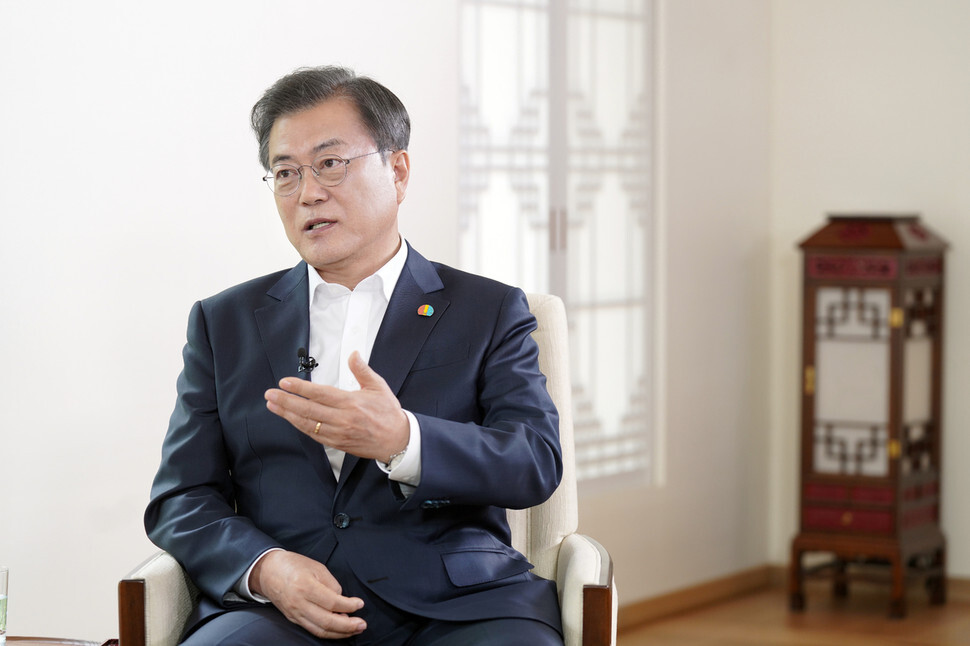hankyoreh
Links to other country sites 다른 나라 사이트 링크
Moon recalls when he first heard about the Gwangju Democratization Movement in jail

On May 18, 1980, a 28-year-old Moon Jae-in was in a holding cell at a police station in Seoul’s Cheongnyangni neighborhood. He’d been arrested that very day for violating martial law after the expansion of the emergency martial law decree the day before. It was through the police themselves that Moon found out in detail about the events of the Gwangju Democratization Movement at the time.
Now the president of South Korea, Moon recalled his experience 40 years ago in a May 17 appearance on “President Moon Jae-in’s May 18,” a special feature presented by the Gwangju MBC network.
“I learned about it from the police officers who were questioning me while I was being detained in a holding cell at a Cheongnyangni police station,” he explained. “The police at the time had a somewhat critical perspective on martial law forces being sent into Gwangju.”
The police shared details about the information that was coming through their intelligence network, including the martial law forces opening fire on civilians and the citizen militia’s resistance. Almost none of the events were reported in the press at the time.
“I was sure that all of this was being reported on in the media, but after I was released, I found out that it was barely reported on at all,” he recalled. “If anything, I found it that it had been distorted to make it seem like a riot by rebels.”
“In a sense, you could say that I was one of the first people outside of Gwangju to find out about all that -- about the truth of Gwangju,” he said.
Moon also described feeling very guilty upon hearing about the terrible suffering the people of Gwangju were enduring.
“Since early May 1980, university students in Seoul had been gathering at Seoul Station every day to hold rallies and demonstrations to demand democracy. The numbers kept growing day after day, until there were no fewer than 200,000 people gathered at Seoul Station on May 15,” he remembered.
“But the Seoul-area university student council leadership who were organizing the demonstrations decided to disband them after rumors began spreading that at that rate, the military was going to be sent in,” he said. In what became known as the “Seoul Station withdrawal,” it was decided that the demonstrations were providing a pretext for military intervention and should be disbanded.
“I have no intention of denouncing the student leaders’ decision at the time. But the end result was that Seoul-area university students gave an excuse for military intervention by holding large-scale demonstrations to demand democracy, only to make the decision to withdraw at the pivotal moment, which meant that the people of Gwangju truly ended up fighting a lone battle against the martial law forces,” he said.
Moon named former President Roh Moo-hyun as the person who came to mind as May 18 was approaching.
“The democracy movement in the Busan area from the 1980s onwards was an effort to raise awareness of Gwangju,” he explained.
“I want to remember Roh Moo-hyun as someone who broadened Gwangju’s scope,” he said.
By Seo Young-ji, staff reporter
Please direct comments or questions to [english@hani.co.kr]

Editorial・opinion
![[Column] Has Korea, too, crossed the Rubicon on China? [Column] Has Korea, too, crossed the Rubicon on China?](https://flexible.img.hani.co.kr/flexible/normal/500/300/imgdb/original/2024/0419/9317135153409185.jpg) [Column] Has Korea, too, crossed the Rubicon on China?
[Column] Has Korea, too, crossed the Rubicon on China?![[Correspondent’s column] In Japan’s alliance with US, echoes of its past alliances with UK [Correspondent’s column] In Japan’s alliance with US, echoes of its past alliances with UK](https://flexible.img.hani.co.kr/flexible/normal/500/300/imgdb/original/2024/0419/2317135166563519.jpg) [Correspondent’s column] In Japan’s alliance with US, echoes of its past alliances with UK
[Correspondent’s column] In Japan’s alliance with US, echoes of its past alliances with UK- [Editorial] Does Yoon think the Korean public is wrong?
- [Editorial] As it bolsters its alliance with US, Japan must be accountable for past
- [Guest essay] Amending the Constitution is Yoon’s key to leaving office in public’s good graces
- [Editorial] 10 years on, lessons of Sewol tragedy must never be forgotten
- [Column] A death blow to Korea’s prosecutor politics
- [Correspondent’s column] The US and the end of Japanese pacifism
- [Guest essay] How Korea turned its trainee doctors into monsters
- [Guest essay] As someone who helped forge Seoul-Moscow ties, their status today troubles me
Most viewed articles
- 1[Column] The clock is ticking for Korea’s first lady
- 2After 2 months of delayed, denied medical care, Koreans worry worst may be yet to come
- 3[Column] Has Korea, too, crossed the Rubicon on China?
- 4[Editorial] When the choice is kids or career, Korea will never overcome birth rate woes
- 5[Correspondent’s column] In Japan’s alliance with US, echoes of its past alliances with UK
- 6Hong Se-hwa, voice for tolerance whose memoir of exile touched a chord, dies at 76
- 7US exploring options for monitoring N. Korean sanctions beyond UN, says envoy
- 8Samsung barricades office as unionized workers strike for better conditions
- 9US overtakes China as Korea’s top export market, prompting trade sanction jitters
- 10[Photo] Smile ambassador, you’re on camera